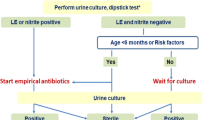Abstract
Introduction and hypothesis
We sought to understand factors that are important to patients for the management of recurrent urinary tract infections (UTI) during both an acute episode and for the prevention of future episodes.
Methods
This was a qualitative study with focus groups in women with recurrent UTIs. Participants filled out information about prior recurrent UTI treatment and the Belief about Medicines Questionnaire (BMQ). Each 90-minute focus group was moderated by a nonphysician psychologist. Line-by-line coding of each transcript by three independent physicians was used to develop emergent concepts and themes using Grounded Theory methodology.
Results
Twenty-six women participated in six focus groups. The average age of participants was 62 years and 77% were post-menopausal. All women had already tried multiple prevention strategies for their recurrent UTIs. The average BMQ-specific scores indicated a net positive attitude toward medicines specifically prescribed for recurrent UTI prevention. Several themes emerged from the focus groups. First, patients wanted providers to acknowledge the high burden imposed by frequent interactions with the health care system for the management of recurrent UTI. Second, patients wanted earlier access to providers knowledgeable in the management of this condition. Third, patients wanted to self-manage their condition through a structured treatment plan with support from their providers. Finally, patients wanted greater emphasis on education and prevention strategies to reduce their antibiotic intake.
Conclusions
Patients with recurrent UTI want more efficient workflows, a framework that promotes self-management in partnership with their providers, and a greater emphasis on prevention.
Similar content being viewed by others
References
Foxman B. The epidemiology of urinary tract infection. Nat Rev Urol. 2010;7(12):653–60.
Hooton TM. Recurrent urinary tract infection in women. Int J Antimicrob Agents. 2001;17(4):259–68.
Medina M, Castillo-Pino E. An introduction to the epidemiology and burden of urinary tract infections. Ther Adv Urol. 2019;11:1756287219832172.
Riet G, Nys S, van der Wal WM, de Borgie CA, et al. Lactobacilli vs antibiotics to prevent urinary tract infections: a randomized, double-blind, noninferiority trial in postmenopausal women. Arch Int Med. 2012;172(9):704–12.
Wagenlehner FM, Vahlensieck W, Bauer HW, Weidner W, Piechota HJ, Naber KG. Prevention of recurrent urinary tract infections. Minerva Urol Nefrol. 2013;65(1):9–20.
Epp A, Larochelle A, Lovatsis D, et al. Recurrent urinary tract infection. J Obstet Gynaecol Can. 2010;32(11):1082–90.
Bærheim KM. Peeing barbed wire: symptom experiences in women with lower urinary tract infection. Scand J Primary Health Care. 1999;17(1):49–53.
Leydon GM, Turner S, Smith H, Little P; UTIS team. The journey from self-care to GP care: a qualitative interview study of women presenting with symptoms of urinary tract infection. Br J Gen Pract. 2009;59(564):e219–25.
Willems CS, van den Broek D’OJ, Numans ME, Verheij TJ, van der Velden AW. Cystitis: antibiotic prescribing, consultation, attitudes and opinions. Family Pract. 2014;31(2):149–55.
Eriksson I, Olofsson B, Gustafson Y, Fagerström L. Older women's experiences of suffering from urinary tract infections. J Clin Nurs. 2014;23(9–10):1385–94.
Sanyaolu LN, Hayes CV, Lecky DM, et al. Patients’ and healthcare professionals’ experiences and views of recurrent urinary tract infections in women: qualitative evidence synthesis and meta-ethnography. Antibiotics. 2023;12(3):434.
Leydon GM, Turner S, Smith H, Little P. Women’s views about management and cause of urinary tract infection: qualitative interview study. BMJ. 2010;340:c279.
Knottnerus BJ, Geerlings SE, Moll van Charante EP, ter Riet G. Women with symptoms of uncomplicated urinary tract infection are often willing to delay antibiotic treatment: a prospective cohort study. BMC Family Pract. 2013;14:1–6.
Scott VC, Thum LW, Sadun T, et al. Fear and frustration among women with recurrent urinary tract infections: findings from patient focus groups. J Urol. 2021;206(3):688–95.
Anger J, Lee U, Ackerman AL, et al. Recurrent uncomplicated urinary tract infections in women: AUA/CUA/SUFU guideline. J Urol. 2019;202(2):282–9.
Brubaker L, Carberry C, Nardos R, Carter-Brooks C, Lowder JL. American Urogynecologic Society best-practice statement: recurrent urinary tract infection in adult women. Female Pelvic Med Reconstr Surg. 2018;24(5):321–35.
Horne R, Weinman J, Hankins M. The beliefs about medicines questionnaire: the development and evaluation of a new method for assessing the cognitive representation of medication. Psychol Health. 1999;14(1):1–24.
Tsianou K, Giannakeas N, Tsipouras MG, et al. Accessing patient views about medication in chronic conditions using the Beliefs about Medicine Questionnaire (BMQ): a review study. J Drug Res Dev. 2017;3(2):1–9.
Glaser B, Strauss A. Discovery of grounded theory: strategies for qualitative research. London: Routledge. 2017.
Sadun T, Scott VC, Ackerman AL, Anger JT, Kim JH. Changes in education and consistency needed in recurrent urinary tract infection care: patient and expert physician perspectives. JU Open Plus. 2023;1(4):e00018.
Saint S, Scholes D, Fihn SD, Farrell RG, Stamm WE. The effectiveness of a clinical practice guideline for the management of presumed uncomplicated urinary tract infection in women. Am J Med. 1999;106(6):636–41.
Hassani D, Flick L, Sangha H, Brown LA, Andy U, Arya L. How do women with interstitial cystitis/bladder pain syndrome make treatment choices? Int Urogynecol J. 2022;1:1–1.
Bodenheimer T, Lorig K, Holman H, Grumbach K. Patient self-management of chronic disease in primary care. JAMA. 2002;288(19):2469–75.
Lorig KR, Holman HR. Self-management education: history, definition, outcomes, and mechanisms. Ann Behav Med. 2003;26(1):1–7.
Funding
Uduak U. Andy is supported by a grant from the National Institute on Aging (R01AG071707).
Author information
Authors and Affiliations
Contributions
S. Agrawal: project development, data analysis, manuscript writing, manuscript editing; H. Harvie: project development, data analysis, manuscript editing; L. Flick: data collection; R.B. Parikh: data analysis, manuscript editing; U.U. Andy: project development, data analysis, manuscript editing; L. Arya: project development, data analysis, manuscript editing.
Corresponding author
Ethics declarations
Conflicts of interest
L Arya has received speaker and education fees from Urovant Sciences. None of the other authors has any conflicts of interest to report.
Additional information
Publisher’s Note
Springer Nature remains neutral with regard to jurisdictional claims in published maps and institutional affiliations.
Appendix 1: sample moderator guide
Appendix 1: sample moderator guide
A urinary tract infection, or UTI, is a bacterial infection of the urethra, bladder or the kidney. Most patients get an infection of the bladder or the urethra. Kidney infections are called pyelonephritis. Recurrent UTI means getting several UTIs. How many UTIs is too many? A common definition for recurrent UTI is getting two or more UTIs in 6 months or three or more UTIs in 1 year. Today, we would like to ask you specifically about how you prevent and treat recurrent UTIs.
-
1.
What are some reasons you think women get recurrent UTIs?
-
2.
We want to understand what measures or actions, if any, each of you takes to prevent an episode of UTI. Can you share what you have tried prior to today?
-
3.
We now want to understand what makes you choose one prevention measure over another. What factors into your decision?
-
4.
What would be your ideal treatment plan for preventing recurrent UTIs?
-
5.
What are your very first emotions once you start to feel symptoms of a UTI episode come on?
-
6.
Now we would like some of you to share what you do once you start to feel symptoms of a UTI.
-
7.
Do your UTI symptoms vary from episode to episode or are they generally consistent?
-
8.
How often has it happened that you thought you were getting a UTI but it turned out you did not have a UTI? How did you manage in those cases?
-
9.
How long does it generally take for your symptoms to start improving once you start antibiotics for an episode?
-
10.
What resources have you used to make decisions about prevention and treatment in the past?
-
11.
What kind of context or information did your doctor initially provide regarding your diagnosis of recurrent UTIs?
-
12.
Now let’s take a step back and think about recurrent UTIs more globally. We want to understand the impact that your recurrent UTIs have had on your life.
-
13.
Thinking about managing recurrent UTIs through the current health care system, what frustrates you or alternatively what works well?
-
14.
Are there any other things that we might have missed that would be important to know about your experiences with recurrent UTIs?
Rights and permissions
Springer Nature or its licensor (e.g. a society or other partner) holds exclusive rights to this article under a publishing agreement with the author(s) or other rightsholder(s); author self-archiving of the accepted manuscript version of this article is solely governed by the terms of such publishing agreement and applicable law.
About this article
Cite this article
Agrawal, S., Harvie, H., Flick, L. et al. Patient perspectives on treatment and prevention of recurrent urinary tract infections: a focus group study. Int Urogynecol J 35, 381–389 (2024). https://doi.org/10.1007/s00192-023-05682-3
Received:
Accepted:
Published:
Issue Date:
DOI: https://doi.org/10.1007/s00192-023-05682-3




